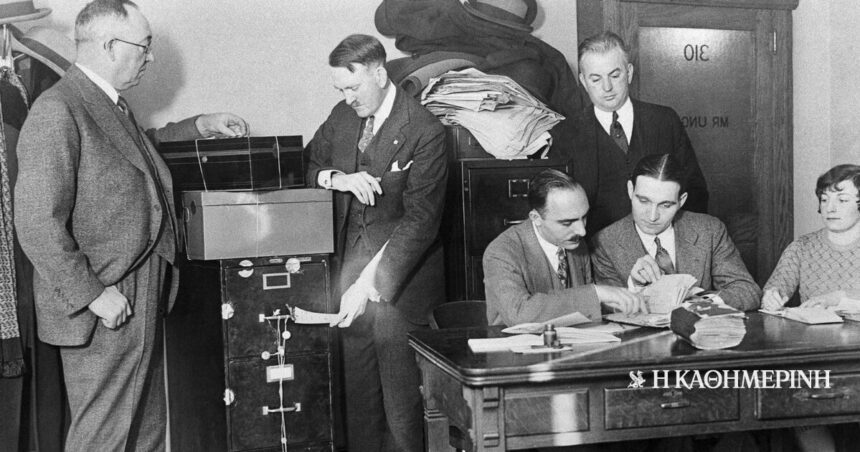The first transatlantic telephone call, the first talking film, the first relatively affordable car, the discovery of penicillin. These are all events that happened in the 1920s, forever changing the way people lived. The debris left behind by World War I gave way to a fast-growing society that progressed, at least until the crash of 1929. Technology and science, however, were not the only areas in which it was felt progress. Another sector was beginning to flourish: organized crime.
Until then, the various gangs handled their affairs with violent attacks that did not seem carefully organized. With her advent of Prohibition (1922-1933), however, the profits of the so-called gangsters from the illegal production and distribution of alcoholic beverages were so great that they forced them to change the organization of their businesses. Now mobsters hired lawyers, accountants, and even investors. Their leaders saw their activity much like running a business, while for the first time gangs of different nationalities cooperated with each other.
The first person who realized the benefits of organizing criminal activities and shaped the world of organized crime as we know it today, running its illegal businesses as legitimate, appears to have been Arnold Rothstein.
By his twenties, he had developed a reputation as a high-stakes gambler and usurer
Born on January 17, 1882, in New York to a prominent middle-class Jewish-American family, Rothstein was destined to follow a respectable profession (his father was a merchant and his brother a rabbi), but he showed little interest in such a path. From a young age, he had a penchant for gambling and was known for his quick mathematical calculations, although he was not a good student. By his twenties, he had developed a reputation as a high-stakes gambler and usurer. However, unlike many others in his profession, Rothstein eschewed overt violence and preferred to use his wealth and connections to exert influence quietly and effectively.
By the time he was 30, he had become a millionaire. He amassed vast wealth through a variety of businesses, from gambling to smuggling and drug dealing. He made history for allegedly orchestrating the Black Sox Scandal of 1919, in which members of the Chicago baseball team of the same name were accused of intentionally losing the World Series after taking bribes.
One of Rothstein’s major contributions to organized crime was his vision of running illegal businesses as if they were legitimate. He saw Prohibition as a major economic opportunity and used his wealth and acumen to create a network of suppliers and distributors, forming one of the first organized crime syndicates.
Rothstein’s life of crime eventually led to his downfall. On November 4, 1928, he was shot during a game of poker at Manhattan’s Park Central Hotel, presumably over an outstanding gambling debt of $320,000
He also engaged in stock manipulation, property buying and a growing drug trade, and financed many up-and-coming criminals, including Charles “Lucky” Luciano and Meyer Lanskywho would later become notorious organized crime figures themselves. Rothstein’s influence on crime syndicates was not only related to their structure, but also to the practices they used. The focus now shifted from impulsive violence to calculated business plans.
Rothstein’s life of crime eventually led to his downfall. On November 4, 1928, he was shot during a game of poker at Manhattan’s Park Central Hotel, presumably over an outstanding gambling debt of $320,000 (about $6 million today). Despite his mortal wound, he refused to identify the assailant, observing that “code of silence” that was common in mob culture. Rothstein died on November 6, 1928, two days after he was shot, at the age of 46.
His death created a power vacuum, providing opportunities for rival factions to emerge and new battles between organized crime families. This upheaval made the underworld more visible to the general public, revealing the extent of corruption and crime in New York, but also paving the way for the rise of the city’s charismatic future mayor, Fiorello La Guardia. La Guardia took advantage of this heightened public awareness and resentment of lawlessness in his campaigns, rallying voters around the promise of upholding the law, enforcing order, and implementing reforms. When he took office in 1934, days after Prohibition ended, La Guardia launched an unprecedented crackdown on organized crime syndicates, Rothstein’s “legacy.”
The life of Arnold Rothstein (who became known by the nickname “The Brain”) has been dramatized many times on the big and small screen, while he became inspiration for numerous fictional depictions – like the character of Meyer Wolfsheim in Francis Scott Fitzgerald’s The Great Gatsby – highlighting the enigmatic, influential role he played in both the underworld and American pop culture.
Column Editor: Myrto Katsigera, Vassilis Minakakis, Antigoni-Despina Poimenidou, Athanasios Syroplakis








